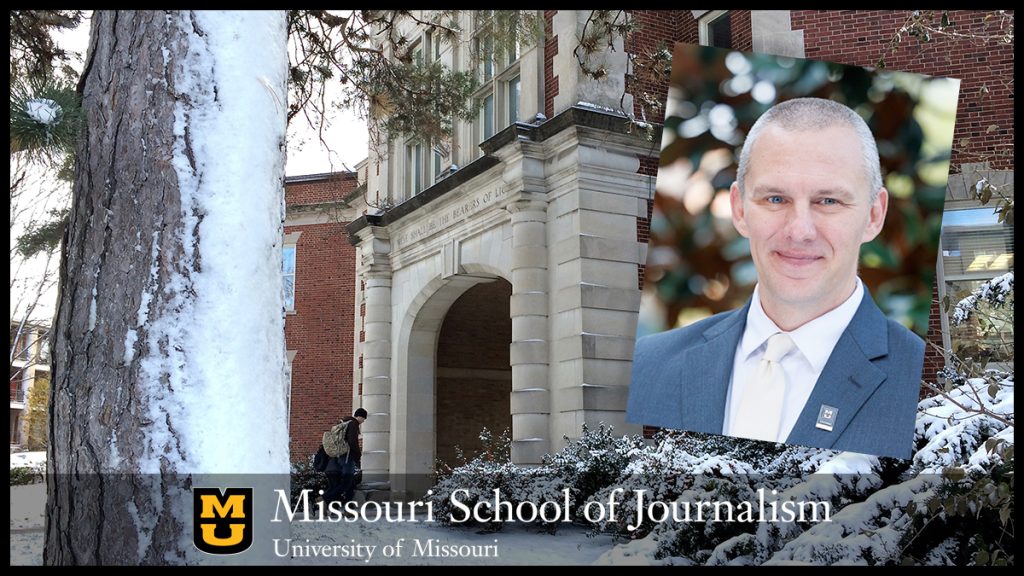Nick Mathews study of Facebook vs. community newspapers lands in acclaimed Digital Journalism journal

COLUMBIA, Mo. (Jan. 10, 2024) — Nick Mathews, an assistant professor at the Missouri School of Journalism’s Donald W. Reynolds Journalism Institute (RJI), has published a research study in Digital Journalism, a premier research journal in the journalism field.
The study analyzes the impact of Facebook on rural and small-town news organizations’ daily operations, zeroing in on the social media platform’s increasing dominance of community news that was once the domain of local newspapers — birthday announcements, new jobs and the sorts of daily life events readers once clipped from newspapers and tacked on their refrigerators.
“The economic challenges that these social platforms have created are well understood, so in this piece, we took a different tack,” Mathews said. “We’re looking at the actual content of publications that is being impacted. It’s not just an economic crisis — it’s an existential one.”
Randy Picht, executive director of RJI, said the study makes it clear that local news organizations need to find new ways to engage with their audiences and actively compete for their attention.
“Nick’s research really gets to the heart of the matter: What do news organizations need to do to stay relevant, especially in rural America?” Picht said. “RJI and the School of Journalism support community-centered news that enriches the lives of its audiences, and that’s what this research is all about.”
“’We Were Facebook before Facebook’: The Existential (Not Only Economic) Threat to Community Weekly Newspapers in the US” was published in Digital Journalism on Dec. 14. Mathews and Benjamin Toff, an assistant professor at the University of Minnesota, interviewed owners and editors of weekly newspapers in Virginia to better understand Facebook’s impacts on content and what they mean for local news organizations.
According to highly respected research from Penny Abernathy at Northwestern University, Virginia has seven counties without a local news source and 94 counties with only one source.
“One editor had a very poignant concern,” Mathews said. “They were concerned their newspaper is not telling the full story of their community anymore. People might not understand how important that submitted content is for weekly newspapers. These papers still want to highlight the individual successes and stories of their communities, but community members are posting that content elsewhere.”
One editor had a very poignant concern. They were concerned their newspaper is not telling the full story of their community anymore. People might not understand how important that submitted content is for weekly newspapers. These papers still want to highlight the individual successes and stories of their communities, but community members are posting that content elsewhere.
Nick Mathews
Another interviewee offered an insight that gave the study its name:
“We were Facebook before Facebook existed.”
Mathews said this loss of a critical component of local news has forced weekly newspapers into a difficult position, in which they see themselves in direct competition with a social media giant and are increasingly forced to fill the gap in local coverage with national and other less-relevant news.
The findings dovetail with Mathews’ other work. He is the second author on a new book that explores the eroding connection between local newspapers and small-town communities in light of a continued downturn in the industry (the Abernathy study indicates that the pace of loss of local newspapers quickened in 2023). “Reviving Rural News: Transforming the Business Model of Community Journalism in the US and Beyond,” is due for release on Feb. 2.
He noted one illustrative example, in which The Hutchinson News in Hutchinson, Kansas, published a front-page story about a senior center — in Hutchinson, Minnesota. The mistake grabbed industry attention for the sheer scale of the oversight, but Mathews said it is indicative of issues that are increasingly common in news organizations all over the country, such as editors and writers that don’t live in the community — or even in the same state — that their newspaper covers.
But while he believes these issues weaken the all-important connection between newspapers and their communities, he emphasized that connection is not a one-way street. As community members turn to Facebook to post about family milestones, local newspapers must to look for alternatives to relieve the resulting economic and content pressures, including ownership by non-local organizations that makes mistakes like the one made by The Hutchinson News more likely.
In other words, the plight of local newspapers is in some cases worsened both by the newspapers and the communities they serve, creating a dangerous feedback loop.
But Mathews said there is reason for hope. In the forthcoming book, he and his co-authors find that news organizations are finding creative ways to repair and strengthen connections with their communities.
“They do things like monthly mingles, just hosting people in their offices with beer, wine and snacks,” Mathews said. “These meetings are so phenomenal to meet people, and it’s hard to have animosity toward people if you have actually met them. You’re not going to turn around and call them ‘the lying media’ if you just talked to them.’”
Mathews, who arrived at the Missouri School of Journalism and the Reynolds Journalism Institute last fall, is just getting started. He is working on a second book focused on the audience perspective of the disconnect between local news and communities, which he intends to publish in 2025, and another project surrounds the police raid on a weekly newspaper in Marion, Kansas, in August 2023.
It’s all part of what he sees as filling an important gap in scholarship on the rural divide.
“What I do is probably a great minority,” Mathews said. “I normally have an audience focus, which is much less emphasized than the journalists’ side. Adding to that, I do it in rural spaces. A growing group are paying attention to rural media, but it’s a really small group. There is a desperate need for more people to do this.”
Updated: January 10, 2024